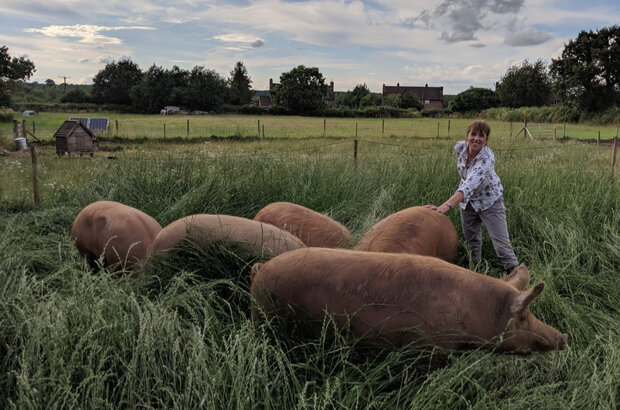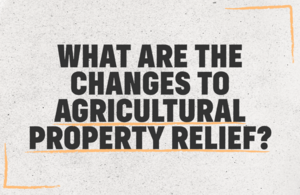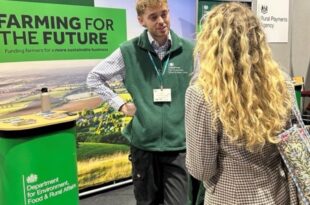
We want to support new entrants to develop successful land-based businesses in England.
We're exploring how best to do this through 5 pilots and we're now over halfway through.
You might remember I wrote a blog post explaining the purpose of the pilots a few months ago.
In this post, I’ll share a snapshot of the pilot participants, what we’ve learned so far and our next steps.
Our participants
Almost 200 people are taking part in the pilots. Together they make up a varied and fascinating group. Most of them don’t fit the typical farmer profile. For example:
- over 80% aren’t from a farming family background
- 54% identify as women. In the general farmer population, the figure is 16%.
- they are, for the most part, a young group. The average age in the general farming population is over 50 years old. 21% are still over 45 while only 12% are under 25.
- 53% want to start up businesses, while 47% wish to scale up their existing business.
A wide range of paths have brought them to take part in the pilots.
For example:
-
Helen, a nature conservationist and Andy, a chef are not from agricultural backgrounds. They started with 2 pigs and now have a business selling meat, charcuterie and other products. They sell direct to the public to maximise value. They want to scale up their business. You'll see Helen in the photo.
-
Richard had a career in the army before moving to events and programme management. Agriculture is his passion and always had a desire to be part of the industry. He is determined to make this a reality by becoming an innovative and regenerative livestock farmer.
- Lilidh spent a decade as a commercial buyer in horticulture. Lilidh now wants to start a business providing advice to households who want to introduce a little more nature into their lives.
- Alex wants to turn his conventional arable 150-acre family farm into a regenerative farming practice with multiple enterprises. He wants to sell direct to the public.
- Claire’s mother grew up on a dairy farm, which she loved visiting as a child. Claire wants to scale up the hemp farm she started in 2021 to create beautiful woven fabrics and bring this incredible regenerative fibre to new customers.
Reports from our pilot leads
We are already starting to learn from the pilots.
We've been hearing from those working in our pilots to support the participants:
Claire Biden at The School for Social Entrepreneurs, which leads the north-east peri-urban and south-west rural pilots, told us: "Their pilots show a real desire from participants to develop innovative approaches to common challenges." Liz Wright, also of the School for Social Entrepreneurs, said: "Participants are developing their skills, deepening their networks and inspiring each other to greater innovation."
Polly Gibb of Harper Adams University, which leads a rural pilot in the West Midlands, said: "I’m struck by the energy and diverse skills set that our delegates bring to the programme. Some are young adults and always knew that farming is their future, so everything so far has been completely focussed on that goal. Others have already had a career elsewhere and so bring very high levels of knowledge about finance, marketing, the third sector and business. This is leading to innovative thinking and a lot of sharing and collaboration."
Nicola Scott of Shared Assets, which leads the south-east peri-urban pilot said: "Everyone is loving the in-person sessions and getting so much from the farming site and its ethos, as well as meeting and hearing from others." She said that most participants have developed more confidence to create business plans, adding that they "now feel like they can give it a go."
Rachael Forster from Tamar Grow Local, who is coordinating the south-west peri-urban startup cohort said: "Participants have fed back that the peer-to-peer sessions has been so valuable in building community and meeting others following the same paths. Although stretched for time by the programme overlapping into the growing season and other work or family commitments, the vast majority participants have remain very engaged with the programme and have found the blended and varied approaches to learning and grounding in business development valuable."





 The
The 
5 comments
Comment by Robin Horton posted on
as with the sfi pilots and us participants, its all about the F2F !!! you just cannot beat it, virtual has its place for convenience and utility but F2F is essential to the mix. I would like to see this pilot overlap with the SFI pilot and when we have our next south west SFI pilot event then these pilot participants local to us should be invited to come along and meet the farmers and share ideas and develop networks. Can someone make this happen please ... ??
Comment by John Calder posted on
Robin, if you can declare where you are it may be possible to progress this. I am in West Dorset.
Comment by Robin Horton posted on
yup im sfi pilot in somerset in the mendip area. The pilot team in defra are planning on running more F2F events this year in the local areas as they did previously and I believe they will be trying to get a bit more hyper local this time. Last time the only event for the south west was one event in exeter. So I think it would be a very strong idea to get the new entrant scheme persons who are local to the pilot F2F events to come along and meet the pilot participants and listen to the speakers and get some very valuable networking in their local areas ??
Comment by Peter Mawson posted on
Any meat business is finished, without access to a small, local, abattoir.
And skilled craft butchers.
What substantive effort is DEFRA putting in to reversing the decline of small abattoirs?
Comment by The Team posted on
Hi Peter,
At the NFU conference in February, Minister Mark Spencer announced that later this year, more funding would be available for small abattoirs. As soon as there's an update on this, we'll share it here on the blog.
Link to Minister Spencer's speech: https://www.gov.uk/government/speeches/farming-minister-mark-spencer-national-farmers-union-conference
Link to his Twitter profile which includes a video summary: https://twitter.com/Mark_Spencer/status/1628091014291288066?ref_src=twsrc%5Etfw%7Ctwcamp%5Etweetembed%7Ctwterm%5E1628121548803477509%7Ctwgr%5E194155c89802a4e7eb8325b68e9652257034fa97%7Ctwcon%5Es2_&ref_url=https%3A%2F%2Fwww.foodmanufacture.co.uk%2FArticle%2F2023%2F02%2F22%2FGovernment-support-for-abattoirs-welcomed-by-the-sector
Best wishes,
The Team